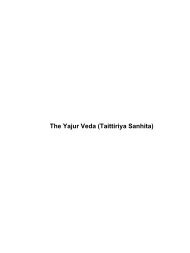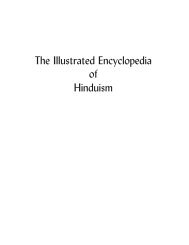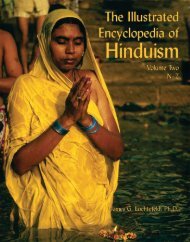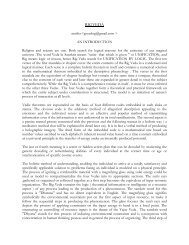A Concise Encyclopedia of Hinduism Klaus K Klostermaie
Create successful ePaper yourself
Turn your PDF publications into a flip-book with our unique Google optimized e-Paper software.
Veökafleÿvara 202<br />
Veökafleÿvara<br />
(‘Lord <strong>of</strong> Veökafla’)<br />
A title <strong>of</strong> Vi•æu as worshipped in<br />
TIRUPATI, situated on the Veökafla hill.<br />
vetäla<br />
A ghost or goblin, which especially<br />
haunts cemeteries, animating dead<br />
bodies. (See also BHÜTA; PRETA.)<br />
vibhava<br />
The appearance (<strong>of</strong> Vi•æu) in a visible,<br />
bodily form (like an avatära).<br />
Vibhï•aæa (‘terrible’)<br />
The younger brother <strong>of</strong> RÄVAŒA, a virtuous<br />
man opposed to the activities <strong>of</strong><br />
the RÄKŸASAS. He became an ally <strong>of</strong><br />
Räma and was made king <strong>of</strong> Laökä<br />
after Rävaæa’s death.<br />
vibhuti<br />
Miraculous powers, dealt with in a section<br />
<strong>of</strong> the YOGA-SÜTRAS. It is also used to<br />
designate the ash-like substance forming<br />
on pictures <strong>of</strong> SATHYA SÄÏ BÄBÄ, which is<br />
said to have miraculous properties.<br />
Vicitra-vïrya<br />
A king who plays a major role in the<br />
Mahäbhärata.<br />
vidhi<br />
(‘injunction’, ‘command’)<br />
According to MÏMÄßSA only that part<br />
<strong>of</strong> the Veda is authoritative that gives<br />
injunctions with regard to things to be<br />
done, the rest being mere ‘eulogy’<br />
(arthaväda).<br />
Vidura<br />
The son <strong>of</strong> VYÄSA by a slave girl, called<br />
‘the wisest <strong>of</strong> the wise’, adviser to both<br />
PÄŒ¥AVAS and KAURAVAS, and ally <strong>of</strong><br />
Päæõavas in the Great War. (See also<br />
MAHÄBHÄRATA.)<br />
vidyä (‘knowledge’, ‘wisdom’)<br />
According to the Upani•ads the highest<br />
aim <strong>of</strong> life and the only means to find<br />
full emancipation from SAßSÄRA. It arises<br />
from discrimination (viveka) between<br />
the eternal self and the transient world<br />
<strong>of</strong> the senses. Indian philosophers have<br />
developed diverse interpretations <strong>of</strong> its<br />
meaning and its acquisition.<br />
Vidyäbhü•ana Baladeva<br />
(18th century)<br />
A follower <strong>of</strong> the CAITANYA school,<br />
author <strong>of</strong> a commentary on the<br />
Brahmasütras from a Caitanyite perspective,<br />
the Govinda Bhä•ya.<br />
Vidyäpati (1400–1507)<br />
Poet, author <strong>of</strong> the celebrated Gïtagovinda<br />
extolling the love between<br />
RÄDHÄ and KØÆŒA.<br />
Vidyäraæya<br />
See MÄDHAVA.<br />
Vijaya-nagara (‘city <strong>of</strong> victory’)<br />
The last Hindu state in India, founded in<br />
1336 by Harihara and Bukka,<br />
MÄDHAVA becoming the first prime minister.<br />
It covered a large area on the<br />
Deccan, up to modern Cennai (Madras).<br />
Its capital was beautified through many<br />
temples, the largest and most famous<br />
being the Virupak•a, sacred to Ÿiva.<br />
Sixteenth-century European travellers<br />
described it as the richest kingdom in<br />
Asia and its capital comparable in size to<br />
Rome. The räyas <strong>of</strong> Vijayanagara were<br />
patrons <strong>of</strong> Tamil, Telugu and Kanarese<br />
poetry and encouraged Sanskrit studies.<br />
They fully supported orthodox<br />
Brahminism and the revival <strong>of</strong> Vedic<br />
animal (and human) SACRIFICES. Muslim<br />
forces conquered and destroyed the city<br />
in 1565. The remnants <strong>of</strong> the rulers <strong>of</strong><br />
Vijayanagara moved to Chandragiri and<br />
the empire disintegrated.


















